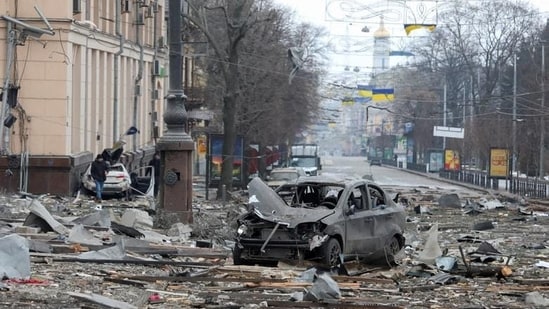In war-torn Ukraine, has international law failed us once again?
The so-called weakness of international law is a tale of the feebleness of global institutions and countries mandated to implement the law.
Russia’s ruthless invasion of Ukraine is the most blatant violation of the United Nations (UN) Charter and international law in recent memory. The fact that someone can breach international law with such impunity has given credence to the adage that international law is weak. But, that’s not true. Several tools can be used to hold Russia accountable or inflict costs for its unlawful behaviour.

The first option for Ukraine is to use the International Court of Justice (ICJ) or the world court. However, Russia does not accept ICJ’s compulsory jurisdiction. Consequently, the only alternative available to Ukraine to drag Russia before the world court is by counting on a treaty that provides for the ICJ as the forum to settle disputes between treaty partners. Ukraine has done precisely this by moving the ICJ against Russia under the Convention on the Prevention and Punishment of the Crime of Genocide (Genocide Convention) — a treaty to which Ukraine and Russia are signatories. Article IX of the Genocide Convention mandates the ICJ to settle disputes related to interpretation, application, or fulfilment of the Genocide Convention. Ukraine’s core argument is that Russia has falsely claimed that the Ukrainians are committing genocide in their territory to start an illegal war. As international lawyer Marko Milanovic argues, this could amount to a “dispute” under Article IX of the Genocide Convention. Arguably, the ICJ will have jurisdiction to indicate provisional (or interim) measures (such as immediate suspension of military activities) to preserve Ukraine’s rights under the Genocide Convention.
The second option, which is underway, is to take collective action against Russia through the UN General Assembly (UNGA) using a mechanism known as the united for peace (U4P) resolution. The U4P resolution empowers the UNGA to make recommendations for the maintenance of international peace and security when there is a threat to such peace and when the UN Security Council (UNSC) fails to do its job due to a lack of unanimity among the permanent members. In the current crisis, the UNSC is deadlocked due to Russia’s veto power. The UNGA’s U4P resolution can also recommend to countries to impose unilateral sanctions (economic, travel, diplomatic) on Russia. Several countries are imposing unilateral sanctions on Russia, so what will a U4P resolution accomplish? As international lawyer Rebecca Barber argues, the States need to act through a UNGA resolution because they are under an obligation to cooperate to end any violation of a peremptory norm of international law ie, fundamental norms from which no derogation is permitted. Russia’s war of aggression violates the peremptory norm.
The third option, being debated in the United States, is that countries can suspend Russia’s most favoured nation status under the rules of the World Trade Organization (WTO). This will make Russia a “trade pariah”. Countries can do this by adopting domestic legislation rooted in Article XXI of the WTO’s General Agreement on Tariffs and Trade. Article XXI empowers a WTO member country to adopt measures “which it considers” necessary for the protection of its security interests taken in time of “war” or other “emergency in international relations”. While the words “which it considers” give discretion to the country to determine the genuine necessity of the measure, Article XXI is not entirely self-judging. Countries will have to design their domestic measures to show their belief in the necessity of such measures.
Finally, amid numerous reports that the Russian forces have targeted civilians and non-combatants in this armed conflict, especially in the shelling of Kharkiv, Russia can also be held accountable under the Geneva Conventions — international legal standards for humanitarian treatment of war.
Unfortunately, countries turn a Nelson’s eye to violations of international law for selfish reasons sold as national security or strategic interests. The so-called weakness of international law is a tale of the feebleness of global institutions and countries mandated to implement the law.
Prabhash Ranjan is a professor and vice dean at the Jindal Global Law School, OP Jindal Global University
The views expressed are personal
Continue reading with HT Premium Subscription




